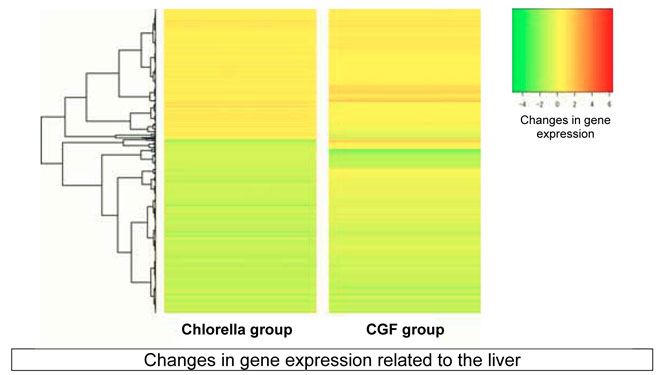- TOP
- List of reports
- Thorough Functional Evaluation of Chlorella and CGF Using Gene Expression Analysis Technology
Thorough Functional Evaluation of Chlorella and CGF Using Gene Expression Analysis Technology
【Scientific information】
Research and Development Department, Sun Chlorella Corporation
Thorough Functional Evaluation of Chlorella and CGF Using Gene Expression Analysis Technology
Presented at the 32nd Annual Meeting of the Molecular Biology Society of Japan
The information needed for life is all encoded on the DNAs, i.e., genes.
However, it is not correct to say that all genes are always working. Organisms read
the genetic information needed at a given time and prepare substances needed for
maintenance of life on the basis of such information, while destroying the
unnecessary substance. So, investigating which genetic information is read (i.e.,
investigating the status of gene expression) will help us understand what is taking
place in the organisms.
We recently conducted a study designed to analyze the functionality of
Chlorella or CGF and presented its results at a scientific meeting. This study is
reported below.
- Objectives
- We previously reported the influence of Chlorella on human and mouse gene expression, i.e., on the way of gene functioning (Reference link 1, 2, 3). Those reports were based on assumption of some specific conditions such as illness. To confirm the basic function of Chlorella and CGF more extensively, the present study used normal mice.
- Methods
- Ten-week-old male ICR mice were divided into the control group (fed with a standard diet), the Chlorella group (fed with a standard diet containing 5% Chlorella) and the CGF group (fed with a standard diet containing 5% CGF). One month after feeding with each diet, the gene expression levels in blood and liver were analyzed thoroughly with the use of DNA microarrays.
- Results
- Intake of Chlorella or CGF resulted in changes of gene expression level. In analysis of the altered gene functions in the liver, changes were noted in the expression of genes known to be involved in lipid metabolism (stimulation of fatty acid beta-oxidation, suppression of fatty acid biosynthesis, etc.) and amino acid metabolism (metabolism of branched chain amino acids, aminoacyl tRNA, etc.). In relation to blood, changes were often seen in the expression of genes associated with branched chain amino acids and immunocyte. Among others, the finding of changes in the function of genes involved in energy metabolism (lipid metabolism and branched chain amino acid metabolism) observed in the liver and blood suggests that these changes will lead to changes in the metabolites formed and affect the entire living body extensively. When estimated from the data on body weight diet consumption and biochemical parameters, these changes seem to be very slow changes rather than rapid changes, possibly giving extensive impacts while maintaining the homeostasis of the entire living body. The results of this 2 - 2 study are partially shown below. They pertain to the genes whose expression in the liver change following intake of Chlorella or CGF.
- Understanding gene expression in normal organisms will lead to understanding of the basic information about the influence of Chlorella on the living body. If the results from this study are combined with the thorough analysis data on the metabolites formed as a result of gene functioning (reference link), it will be possible to understand the effects of Chlorella on the whole "living body" in a systematical manner and also to answer the question as to why Chlorella has extensive effects.

Details
- Professional:
society meeting - 32nd Annual Meeting of the Molecular Biology Society of Japan (2009)
- Title:
- Thorough Functional Evaluation of Chlorella and CGF Using Gene Expression Analysis Technology
- Authors:
- Michie Kobayashi1), Masaki Fujishima2), Yukari Arakawa2), Tohru Mizoguchi2), Tohru Matoba1), Kenichi Matsubara1
- Affiliation:
- 1) DNA Chip Research Inc., 2) Sun Chlorella Corporation





